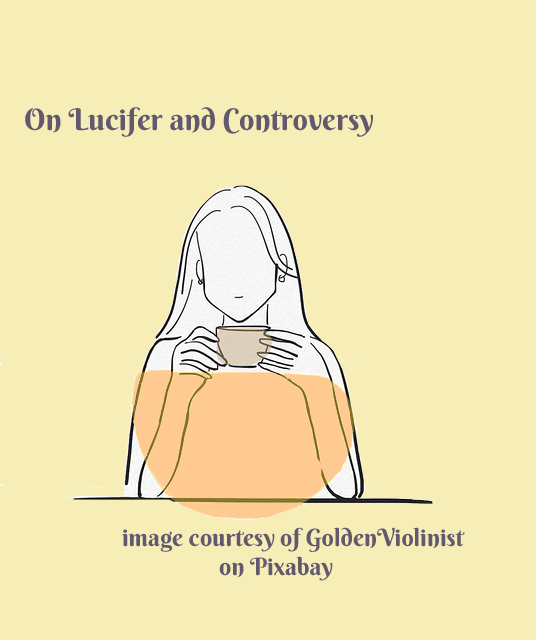
As a show shrouded in controversy, Lucifer did not get a fair shake among tv audiences. Netflix allowed it to have a second chance at earning its rightful place as a cult favorite. The show was canceled in its third season by FOX, only to be revived by Netflix for three more seasons. As I browsed through Netflix, I coincidentally found it in 2021 and it has become among my Netflix rewatches.
Lucifer caters to different audiences, which is no easy feat to accomplish. It is a testament to the show’s versatility. The series triumphs as it summons niche story elements without alienating audiences who would not usually reach for a show like it. Whether you are new to Lucifer or not, this post will hopefully get you to give it a shot or at least see why it is a favorite of many audiences.

The Show’s Premise
Meet Lucifer Morningstar. He’s a young carefree nightclub owner who has it all: looks, charm, and money. But Lucifer isn’t your average rich guy. He has a past, unlike any one person you could meet. You see, Lucifer is a fallen angel. Not only that, but he was the previous ruler of Hell, who walked out on the job and drove straight to LA.
Lucifer spends his time partying and granting favors to people. Until a person he granted a favor for is found dead. Suddenly, he is face to face with Chloe Decker, an uptight police homicide detective. The rest is history. This duo, along with other characters, uncovers the complexities of crime and punishment. The punishing angel, Hell’s ruler, is then on a journey of morality, sin, redemption, and the occasional musical number.

The Show’s Controversy
The misunderstanding of Lucifer’s background has given the show a blasphemous reputation. However, the show doesn’t claim to be didactic. It is based on a graphic novel, not a religious text. Still, I would argue that the show is surprisingly in favor of faith. Claiming otherwise is mostly a knee-jerk reaction. I understand people defending the sanctity of their spiritual texts. But, some people may need a different way to connect to faith.
The series preaches wholesome and hopeful approaches to faith. As the main character, he blames his poor choices on simply being created this way. No one tells him that this is valid. It isn’t. The show’s message is that we are able, to an extent, responsible for our choices. We are capable of rewriting our future by taking accountability for our mistakes and learning from them.
I would argue that watching this show may increase someone’s faith, or propel someone onto a path of discovery of faith. One of the main characters is a person who holds faith dear to her heart. While the intensity of her faith flickers momentarily, she never gives up on it. Nobody makes fun of her faith or attacks it either.

All the Ways Literary Buffs Would Delight in Lucifer
At its core, the show Lucifer mirrors elements of John Milton’s Paradise Lost. This series serves as a treatise from the Devil’s perspective. Paradise Lost is a methodical statement outlining all the reasons why Lucifer feels like he was wronged. By extension, as he proves the injustice in his treatment, he asserts that he has every right to rebel against God.
As someone who read Paradise Lost, I found the television show to be a nuanced response to Milton’s work. It’s all the more reason to watch Lucifer as it throws this character into modern-day society to face varying degrees of moral issues. Not only this, but Lucifer is also stepping into the world of a cop, who is an enforcer of justice and law. Is he able to always see that justice has been served according to his standards? And what does he make of that incongruency?
Literary fans enjoy a good ethical dilemma. At its heart, the show is unraveling moral quandaries. The traditional approach to Lucifer’s story is held together by the notion of fate. Lucifer was created as a sinful and prideful angel. In other words, he was destined to fall from grace. By centering him, the show takes on the challenges of the worst of the worst. It posits that maybe the main character could choose another path. Would he be able to change his story? What if he was0self-aware? What if he saw the flaws in his perception of the world around him? Could he change his narrative then?

How Warping Social Norms on Lucifer Will Thrill Fans of Psychological Drama
Because Lucifer is solving mysterious crimes, he encounters some of humanity’s darkest elements. In doing so, the show dabbles in elements of psychological dramas. psychological dramas explore human psychology. Author of several psychological thrillers Sebastian Fitzek outlines elements of the psychological thriller. Several of them show up on Lucifer.
Fitzek suggests a perversion of the day-to-day in a psychological thriller. That is exactly what Lucifer does on two levels. First: for the show’s human characters, each crime rattles normalcy. The victims are startled and betrayed by the flimsiness of normalcy.
But, for Lucifer himself, breaking rules and seeking vengeance are normal. But what psychological drama fans wouldn’t expect is the ruler of Hell is baffled by humans’ version of evil. On more than one occasion, the main character distances himself from the crimes humans blame him for. In fact, as seasons of the show progress, so does Lucifer’s inability to justify most of the cases he’s solving with Chloe and her team.
It’s Lucifer’s struggle that makes this show richer. He has to find his position on humanity as someone who is ostracized by his family–a celestial family.

Lucifer’s Messy Family Dynamic Will Enrapture Fans of Psychological Dramas
Fitzek notes familial conflict as a feature of promising psychological thrillers. Lucifer is at crossroads because he is the black sheep of his family. He is marked as the “bad” kid. But, the psychological elements of how he became this way play out throughout the show. As the series progresses, audiences see more of his family through his therapy sessions mostly. The tension comes into view more as Amendiel and Lucifer try to coexist on Earth. Amanediel, once God’s favorite confronts living on the same plane as God’s supposed troublesome offspring.
It is a curious cord to play since the troubled son is the creation of his Father. His Father as a creator made him and his siblings the way they are. But, shouldn’t this make God sympathetic since He knows what is within Lucifer? Should he not have anticipated the needs of his creation to prevent a downfall, a fall from grace?
On a similar note, as a father, should God have not seen the struggle of His son as a sign for a much-needed change in approach?
This leads to another fascinating exploration of Lucifer’s childhood home as a toxic environment. Seeing the toll of God’s demanding position as a creator makes him a sympathetic figure. But, the show is clever in bringing different perspectives so that nobody in that family is fully given reign to blame everyone else. That alone will tug at the hearts of audiences and get plenty of discussions going.
Every member of Lucifer’s family holds a position of celestial power and responsibility. They are responsible for maintaining a whole universe in order. However, the show complicates things by highlighting how this much responsibility can affect this celestial family. What happens when siblings crave their parent’s attention so much that they make horrific choices? Lucifer and his siblings parse through the nuances of this question.
Humanizing the divine may seem like a bad move for some. However, I argue that it adds dimension to Lucifer. If the Devil isn’t bad for the sake of being so. Morality does not appear to be an either-or choice. We all have complicated family relationships. Lucifer’s family plays a part in his development. To move forward, he has to make peace with his family.

Buddy Cop Enthusiasts Will Indulge in Lucifer and Chloe’s Banter
If you are into a buddy cop drama, this show is also for you. Buddy cop stories work on several levels. First, there is a mystery driving the narrative. But, more importantly, the tension between the team solving the mystery also entertains the audience. Usually, buddy cop stories involve an oddball team. This team is often made up of opposites. Sometimes, it’s gender, social class, or race that separates these two individuals.
In Lucifer’s case, you get the oddest team. Let’s start with Lucifer and Chloe Decker. No matter how hard he tries, Lucifer is a celestial being. This alienates him from humans. There’s a lot that Lucifer does not understand. He does not grasp the basics of humanity, like childhood. Naturally, his understanding of human emotions is on shaky grounds. Chloe Decker is the opposite of Lucifer. She is a mother to her daughter Trixie. While her career is taxing, she is continuously shown as a parental figure often, an aspect that Lucifer doesn’t comprehend.
Another level that Chloe is different from Lucifer is the relationship she had with her father. She is the daughter of a cop. Rather than rebel against her father, she chooses the same career. Her counterpart, on the other hand, is rebellious and antagonistic when it comes to his father (and family).
As a cop, she is by the book. She is aware of the law and she follows it to a T. Lucifer is not like that. He has tampered with crime scenes, long after the rules of police work were explained to him. There is a general air of disregard for the law when it comes to Lucifer. He is not in this for justice. Lucifer is mostly trying to understand humans and how they justify immoral acts while blaming their choices on his influence.
It probably goes without saying: Lucifer and Chloe don’t agree on how to approach their cases. The push and pull between Chloe’s firmness and Lucifer’s lack thereof create an interesting dynamic, to say the least. Some situations are funny and others are more dramatic. But fans of buddy cop tropes will be entertained by this mismatched team. Each person has deeply held beliefs on how to approach justice. They will butt heads. How they manage to get things done, you will have to see for yourself.
Final Words
If you are interested in a morally grey hero, Lucifer as a central character will entertain you. His story is poetic, heartfelt, and nuanced enough to keep you hooked from seasons one to six. Despite some weaker plot lines in later seasons, there is beauty in watching the show take on various storytelling techniques that cater to different audiences.
I am a sucker for morally grey heroes, antiheroes, and straight-up villains. You can read my discussion of V.E. Schwab’s Vicious here, where villainy and heroism’s definitions are blurred in a delightful way.
You must be logged in to post a comment.